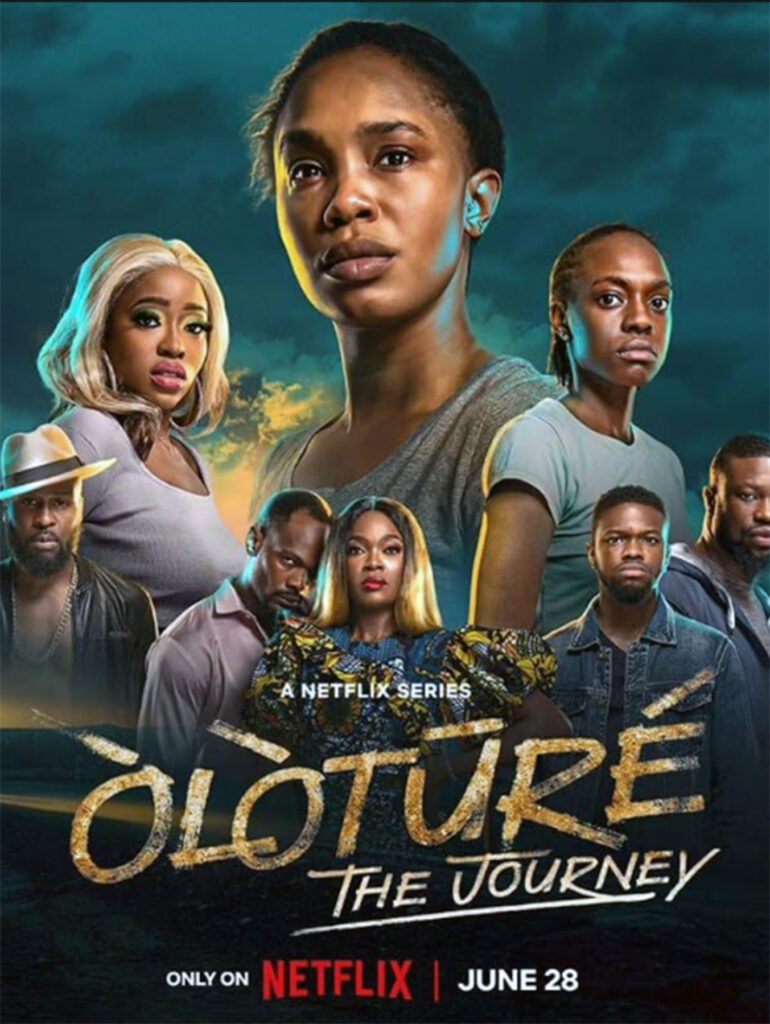
By Patience Chat Moses
In recent years, Nollywood has evolved from a purveyor of entertainment to a platform for advocacy, using storytelling to shed light on pressing social issues. One such film that stands out in this new wave is Olotùre, produced by media mogul Mo Abudu. The initial movie was released in 2019 and was later followed by Oloture: The Journey in June 2024. With Oloture, Abudu delves deep into the dark world of human trafficking, presenting a narrative that is as gripping as it is heartbreaking. Olotùre is not just a film; it is a call to action, urging society to confront the harsh realities faced by many Nigerian women.
The plot unveiled
Olotùre follows the story of a young Nigerian journalist who goes undercover to expose the human trafficking network in Lagos. Her journey is fraught with danger as she navigates a world where trust is a luxury, and survival is the ultimate goal. The film’s narrative is raw, intense, and unflinchingly honest, pulling no punches in its portrayal of the exploitation and abuse suffered by women trapped in this vicious cycle. What makes Olotùre particularly powerful is its grounding in real-life events, which lends the story a disturbing authenticity. The movie explores themes of sexual violence, the quest for survival, quest for greener pastures as characters embark on life-risking journeys across the desert to get to Europe.
Mo Abudu often hailed as the “Oprah of Africa,” has been a significant force in the Nigerian entertainment industry. Through her company, EbonyLife Media, she has consistently produced content that resonates with both local and global audiences. With Olotùre, Abudu ventures into more serious territory, using the medium of film to spark conversations about human trafficking, a scourge that continues to devastate lives across Africa and beyond. Abudu’s decision to tackle such a heavy subject underscores her commitment to using her platform for more than just entertainment. By bringing Olotùre to life, she amplifies the voices of countless victims who might otherwise remain unheard. Her work demonstrates the potential of Nollywood to be a force for social change, pushing boundaries and challenging the status quo.
Since its release, Olotùre has garnered both critical acclaim and widespread attention. The film has sparked conversations on social media, and in community forums. It has shone a spotlight on the grim reality of human trafficking, which often operates in the shadows, away from the public eye. The movie’s success is not just in its storytelling but in its ability to evoke a strong emotional response from its audience, compelling viewers to reflect on the broader implications of the story.
In Nigeria, where the first part of the film is set, Olotùre has resonated particularly strongly. The country’s ongoing struggles with poverty, unemployment, and gender inequality create a fertile ground for human trafficking networks to thrive. The film brings these issues to the forefront, highlighting the urgent need for comprehensive solutions that address the root causes of trafficking.
Moreover, Olotùre has also sparked discussions on the responsibilities of filmmakers and the ethical considerations in storytelling. While the film’s graphic depiction of violence and exploitation has drawn some criticism, it has also been praised for its unflinching honesty. By not shying away from the harsh realities, Olotùre forces viewers to confront the uncomfortable truths about the world we live in.
The role of media in social advocacy
Olotùre exemplifies the growing trend of films that go beyond entertainment to serve as tools for social advocacy. In an industry often criticized for being overly commercial, the success of such a film signals a shift towards more meaningful content that reflects societal issues. Mo Abudu’s work with Olotùre sets a precedent for future filmmakers, demonstrating that cinema can be both impactful and commercially successful.
As the conversation around human trafficking continues, the media must keep the issue in the public eye. Films like Olotùre play a vital role in this regard, reminding us that behind every statistic is a human story—a story of pain, struggle, and, ultimately, survival. By supporting such initiatives, audiences can contribute to the fight against human trafficking, helping to bring about a world where no one has to endure the horrors depicted in Olotùre.
Overall, Olotùre is more than just a film; it is a powerful statement against the exploitation of the vulnerable. Through her work, Mo Abudu has shown that Nollywood has the potential to effect real change, using the power of storytelling to illuminate the darkest corners of society. As we move forward, it is imperative that we continue to support and engage with content that challenges us to think critically about the world we live in. Olotùre may be a fictional story, but the issues it highlights are all too real. It is up to us, as a society, to ensure that the conversation doesn’t end when the credits roll.


